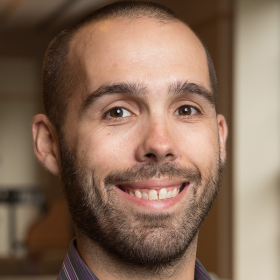Teaching Partners
Dustin Voss
Dustin Voss
| School: | Fenger Academy High School |
| Location: | Chicago, IL |
In September 2017, Dustin Voss – a 10th-year teacher at Fenger Academy on the south side of Chicago – attended a case method workshop at Harvard Business School. After returning to his classroom, Dustin decided to bring significant parts of the "History of American Democracy" curriculum into his civics and political science classes, and he began thinking about how he could adapt both the case method and the Harvard cases to best serve his students.
At Fenger, 98 percent of the student population qualifies as economically disadvantaged, and 60 percent do not have permanent or adequate housing. The most recent PARCC assessment data indicate that only 11 percent of Fenger students "met expectations" on the 2016 English Language Arts exam. Despite the challenges faced by his students, Dustin was eager to introduce them to the case method. He had found in the past that even students who read far below grade level will strive to make meaning from demanding texts, especially if the texts give room for students to offer their own opinions. The "History of American Democracy" case studies seemed like a perfect fit.
Nevertheless, Dustin immediately recognized the significant challenges that would arise, since the cases were "more rigorous and longer than most secondary history texts [his] students had read." To address these challenges and help support his students, he devised a variety of activities to break down the cases and to provide greater structure, including drills that focused on how to annotate a text and how to keep track of evidence in graphic organizers. As the year progressed, Dustin gradually reduced this scaffolding so that students could impose their own structure, which he found to be a successful strategy. Ultimately, Dustin discovered that the case studies – and the case method – lived up to his aspiration to "promote engagement by putting student agency and authority at the center of teaching."
Beyond designing specific activities to support his students’ success, Dustin also innovated in other ways. At Harvard, students are encouraged to meet in small groups outside of class to discuss each case in preparation for the larger in-class discussion. Dustin chose to bring this feature of the case method directly into the classroom. In constructing small groups, he sorted students heterogeneously according to their performance on previous assessments, so that each group would represent a range of skill levels with respect to reading and critical analysis. He quickly found the small groups to be "where most of the magic happens," as his students "push[ed] hard to make sense [of the texts] and support each other." Although Dustin continued to conclude each case with a class-wide discussion, he saw it as "something like a consolidation of knowledge" for students. The small groups, he reported, were where he "observed some of the best and deepest thinking."
Although the Harvard cases remain challenging, Dustin's students have continued to rise to the challenge, making excellent progress and continually demonstrating how use of the case method impacts their thinking about history and government. Whereas Dustin believes that previous classes had led students "to a dichotomous understanding of history," in which simple questions seemed to have clear-cut answers, the case studies require students to adopt "a more nuanced view" of history, including of delicate historical topics such as President Lincoln’s position on slavery. In Dustin's view, one of the surest signs that the case method was working was that his students began to apply some of the most sophisticated concepts in the cases to the world around them —analyzing current events, for example, through reference to Madison's concerns about tyranny of the majority.
Based on the remarkable success he has seen already, Dustin is excited to continue his use of the case method in the years ahead. He has also begun sharing his innovative strategies for increasing the accessibility of the cases with interested teachers in Chicago and around the country.

